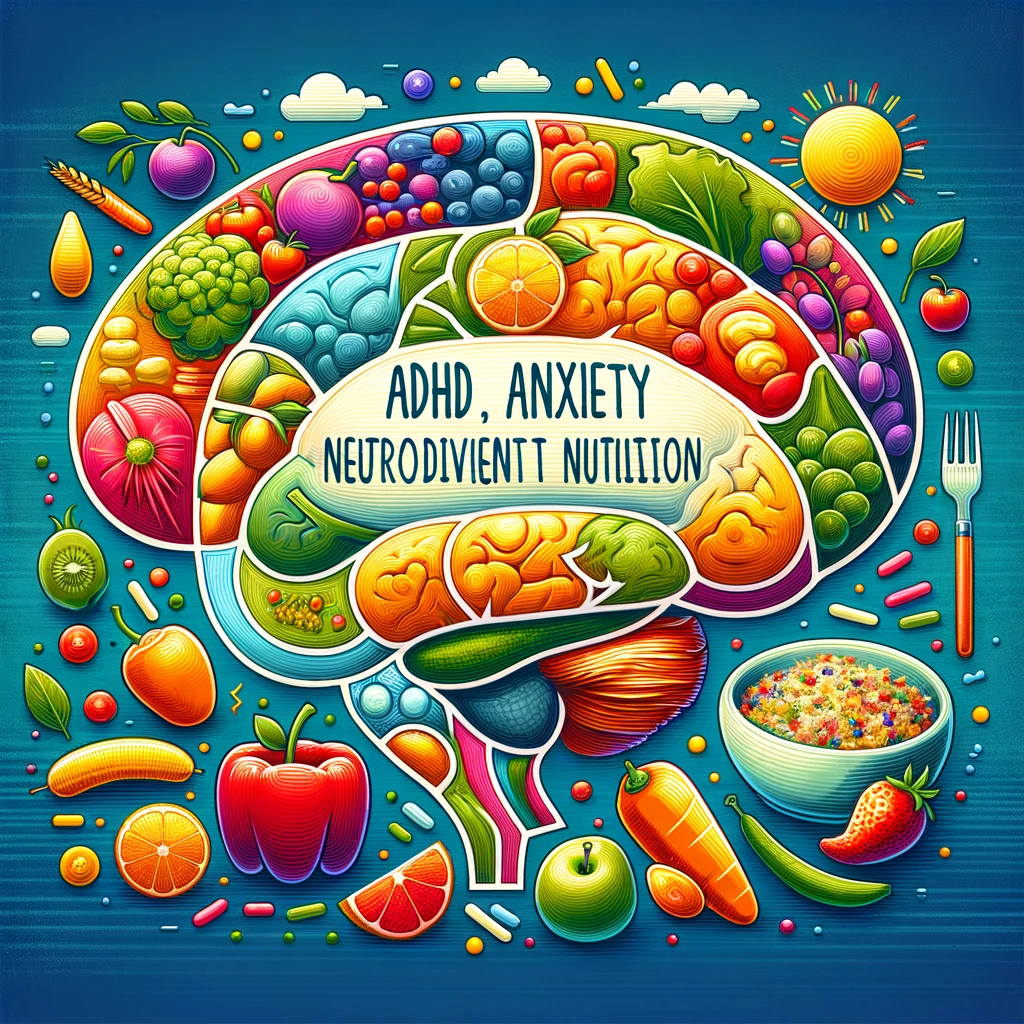ADHD, Anxiety, and Neurodivergent Nutrition: The Power of Balanced Diets for Healthier Minds
ADHD (Attention Deficit Hyperactivity Disorder), a neurodevelopmental disorder, and anxiety often co-exist, particularly among neurodivergent individuals. These conditions are known for symptoms like inattention, impulsiveness, hyperactivity, and persistent worry. A multitude of factors may cause these experiences, including genetics, environmental factors, and surprisingly, diet and nutrition. Let's delve into the intricate relationship between food, ADHD, anxiety, and neurodiversity.

Evidence suggests that thoughtful nutrition and a balanced diet can substantially aid in the management of ADHD symptoms and anxiety, supporting enhanced mental well-being. Join us in exploring how to incorporate such dietary changes into a comprehensive treatment plan for a healthier mind and life.
 Nutrition and Neurodiversity: The Diet-ADHD-Anxiety Nexus
Nutrition and Neurodiversity: The Diet-ADHD-Anxiety Nexus
Exciting research is unraveling the complex relationship between our diet and its impact on our brains and bodies, particularly for neurodivergent individuals dealing with ADHD and anxiety. A balanced diet can promote cognitive function, maintain good health, heighten energy levels, foster concentration, and mitigate mood swings – common challenges neurodivergent individuals navigate regularly.
Rethinking Nutrition for Neurodivergent Wellness
A balanced diet filled with nutrient-rich foods can promote overall health and mental clarity. Consider incorporating the following elements into your diet for better symptom management:
- Omega-3 fatty acids: Brain-friendly foods rich in Omega-3 fatty acids, such as salmon, tuna, and flaxseeds, can enhance cognition and concentration, crucial for those living with ADHD and anxiety.
- Lean proteins: Foods like eggs, poultry, beans, and lentils provide lean proteins that help stabilize blood sugar levels. This balance can reduce hyperactivity and impulsivity, often associated with ADHD.
- Fruits, vegetables, and whole grains: These nutrient-dense foods provide a sustained energy release, helping curb mood swings and promote focus, relevant for both ADHD and anxiety management.
Foods to Avoid in Neurodivergent Diets:
Leveraging nutrition for neurodivergent support also involves limiting foods that could exacerbate ADHD and anxiety symptoms. These may include:
- Artificial additives and preservatives: Certain colorings and preservatives may increase hyperactivity in some individuals. Minimize foods with these substances, such as sugary drinks and processed snacks.
- Sugary foods: Despite providing quick energy, sugars can cause a speedy rise and fall in blood sugar levels, potentially worsening ADHD and anxiety symptoms.
- Allergenic foods: Potential allergens like eggs, milk, peanuts, fish, etc., might aggravate symptoms in some cases. Tracking these triggers with an elimination diet approach can be useful.
Crafting a Neurodivergent Nutrition Plan
Customizing a nutrition plan that suits your individual needs is the key. Observing how specific foods affect your symptoms and maintaining a food journal may help.
It's always recommended to consult with a registered dietitian or nutritionist who understands the unique requirements for managing ADHD and anxiety. Digital resources like GoblinX, designed for those with neurodivergent conditions, can further support your journey towards healthier eating habits and better symptom management wherever you are.
Final Thoughts
Remember, a balanced diet is not a cure, but a vital strategy in your toolbox for managing ADHD and anxiety symptoms. In combination with therapies such as Cognitive Behavioral Therapy (CBT) and appropriate medication, this approach can provide a more comprehensive plan for managing these conditions and enhancing your overall well-being.
Investing in proper nutrition is a significant step towards healthier minds and bodies. Since everyone is unique, it's important to understand our bodies' responses to different foods while crafting personalized diet plans.









